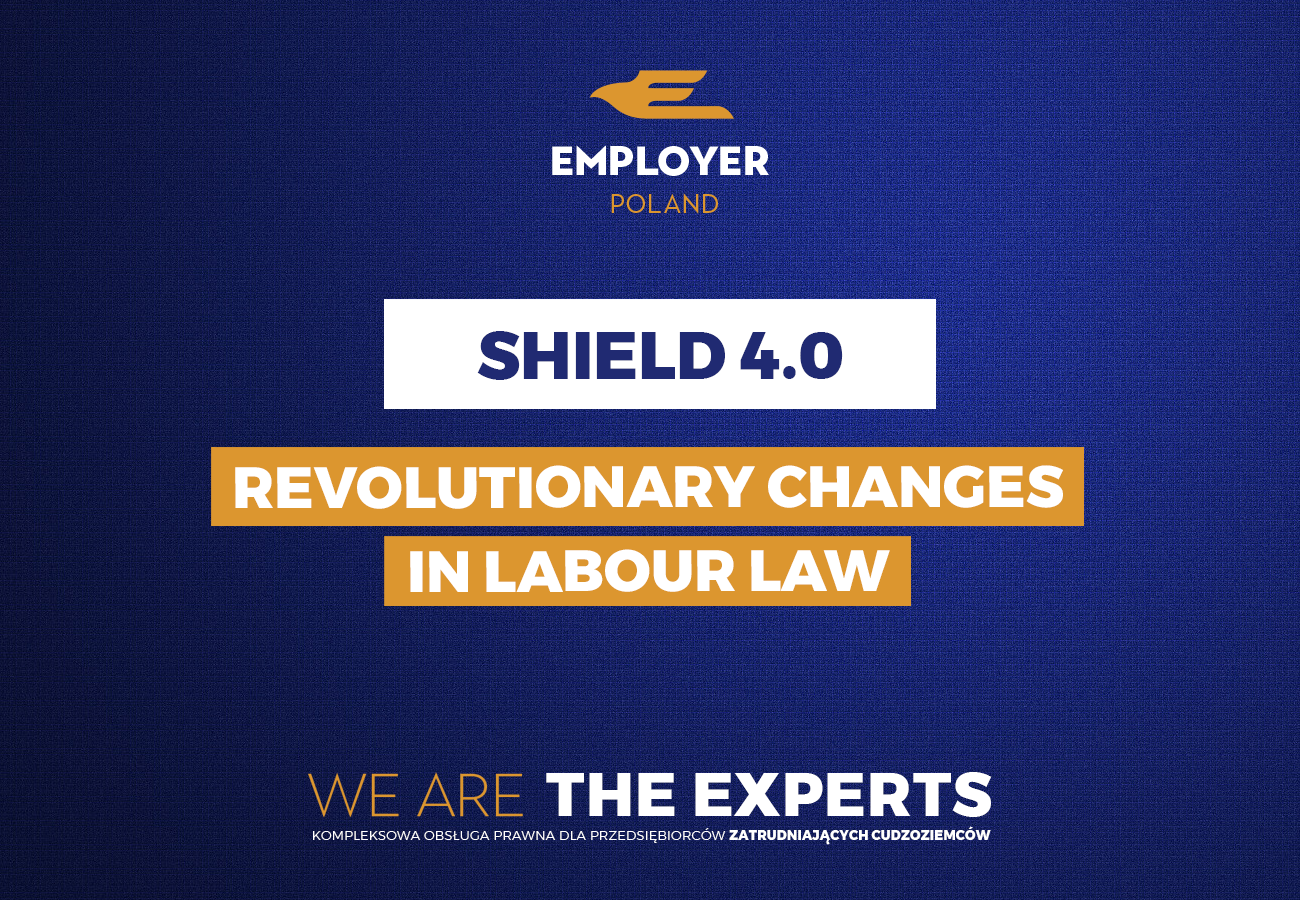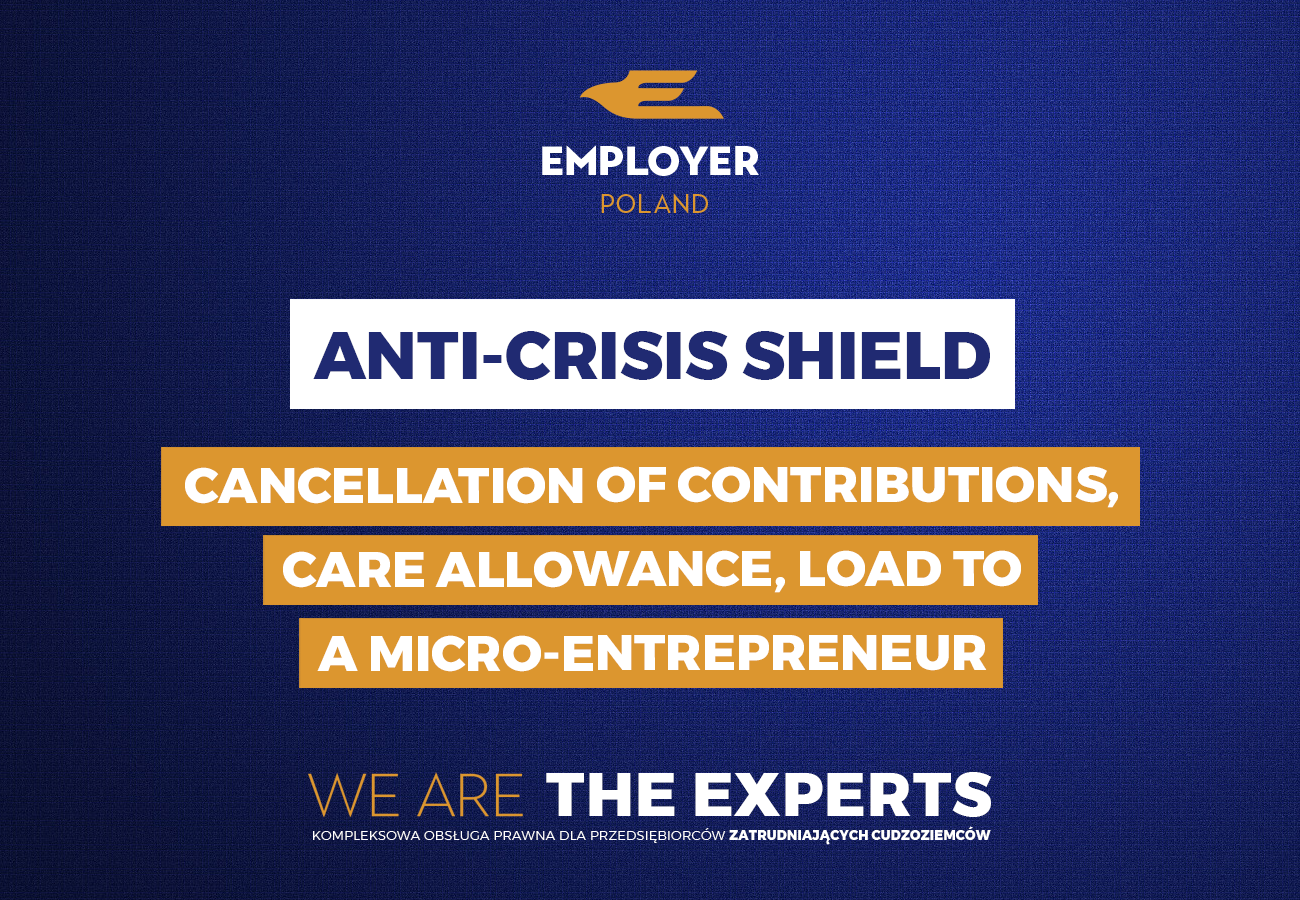
Anti-crisis shield: project details
In the fight against the economic consequences of the coronavirus epidemic, the Government proposes a number of solutions, the main goal being defence against job losses, support for health care, financial system security, support for entrepreneurs and public investments. The fight against the economic consequences of the epidemic is to be based on five pillars. The estimated value of the package is about 212 billion złoty. The special act is expected to be adopted at the end of this week.
This article discusses in detail the most important premises of the project.
Employee security and job security, care allowance
Co-financing by Starosta
The project provides for co-financing of part of employee salary costs and due social security contributions by the starosta, in the case of a decrease in economic turnover following the occurrence of COVID-19 within any of 2 consecutive months after 1 January 2020 until the day preceding the day of submitting the application for co-financing compared to the total turnover in any of two consecutive calendar months of the previous year. Co-financing may be granted for a period not exceeding:
- 6 months: for micro and small enterprises;
- 3 months: for medium-sized enterprises.
The amount of funding depends on the decrease in turnover and is:
- In the case of a decrease of at least 30%: the product of the number of employees stated in the application and 50% of the minimum salary;
- at least 50%: the product of the number of employees stated in the application and 70% of the minimum salary;
- at least 80%: the product of the number of employees stated in the application and 90% of the minimum salary.
Starosta may also grant the entrepreneur who is a natural person and who does not have employees, co-financing for the part of the costs of running a business in the case of a decrease in business turnover as a result of the occurrence of COVID-19.
Benefits during economic downtime
The entrepreneur may apply for benefits for the protection of jobs, benefits for co-financing the salary of employees affected by economic downtime or reduced working time, provided that he is not in arrears with tax liabilities, social security contributions, health insurance, Guaranteed Fund Employee Benefits, Labour Fund or Solidarity Fund until the end of the third quarter of 2019. The co-financing referred to above comes from the Guaranteed Employee Benefits Fund up to 50% of the minimum salary for work. An entrepreneur with a decrease in economic turnover as a result of COVID-19 may limit the working time by 20%, not more than 0.5 of full-time employment, where the salary cannot be lower than the minimum salary for work. The salary is co-financed up to half the minimum salary, but not more than 40% of the average salary for work.
Downtime benefits
A person who conducts non-agricultural business activities, performs an agency contract, a mandate contract, any other contract for the provision of services: a downtime benefit is payable if he/she is not subject to other types of social insurance. Such a benefit is payable to:
- citizens of the Republic of Poland, or
- citizens of European Union Member States, European Free Trade Association (EFTA) Member States having the right of residence or permanent residence in the territory of the Republic of Poland – parties to the agreement on the European Economic Area or the Swiss Confederation, or
- foreigners legally staying in the territory of the Republic of Poland.
The benefit is granted at 80% of the minimum salary for work if the income has decreased by 15% or more compared to the previous month, provided that the income obtained in the month preceding the month in which the application for downtime benefit was filed was not higher than 300% of the forecast average monthly gross salary in the national economy in 2020. The above requirement does not apply to a person conducting non-agricultural economic activity, to whom the provisions on flat-rate income tax in the form of a tax card apply and who benefited from the exemption from sales of goods and services tax based on Article 113 paragraphs 1 and 9 of the act of 11 March 2004 on tax on goods and services (Dz. U. z 2020 r. poz. 106).
The project also includes an extended catalogue of persons entitled to additional care allowance. Among other things, it introduces the possibility for a working parent of a child under 8 years of age to receive additional care allowance of 14 days in the event of the closure of a day care facility, children’s club, kindergarten or school where the child attends due to COVID-19.
The project allows employers to set more flexible employment conditions in order to preserve jobs: limitation of uninterrupted daily and weekly rest, introduction of an equivalent working time system in which it is permissible to extend the daily working time, but not more than to 12 hours, in a reference period not exceeding 12 months.
ZUS contributions
The Government’s previous proposals to postpone or split ZUS contributions in instalments have encountered numerous controversies on the part of entrepreneurs. It is likely that the final draft of the COVID-19 act will provide for exemptions from ZUS contributions for 3 months for self-employed workers, contractors and micro-enterprises with up to 9 employees if their revenues decreased by 50%. Employees will not lose their contributions: it is planned for FGŚP to cover them.
Other solutions, deferrals of certain obligations
- It is expected that the time limit for submitting information to the Central Register of Real Beneficiaries will be extended by 3 months. Note that the Central Register of Real Beneficiaries (CRBR) is a system in which information about actual beneficiaries, i.e. natural persons exercising direct or indirect control over the company, is collected and processed. In the case of companies that were entered in the National Court Register before the entry into force of the regulations on CRBR, i.e. before 13 October 2019, the obligation to submit information to CRBR expires on 13 April 2020. In the case of companies entered in the National Court Register after 13 October 2019, information to CRBR shall be reported not later than within 7 days from the date of entry of the above companies in the National Court Register;
- Exemptions from property tax: land, buildings and structures related to conducting business activities for the stated groups of entrepreneurs whose financial liquidity has deteriorated in connection with COVID-19 for part of the year 2020: a resolution may be adopted by the Gmina Council;
- Exemption from the PCC tax for a loan agreement concluded before 31 August 2020, if the borrower is the entrepreneur in the meaning of Article 4 paragraphs 1 or 2 of the Entrepreneurs’ Law of 6 March 2018, whose financial liquidity has deteriorated in connection with COVID-19.
- Possibility to postpone the time limit for testing technical devices, with the possibility of operation for a maximum period of the next 6 months.
- Reduction in the amount of rent for sales area over 2,000 m2 if, during the period of epidemic emergency, activity was banned or limited by law – by 90% compared to the rent due to the lessor under the contract.
- Extension of the time limits from 30 to 180 days for the registration of a vehicle that is not a new vehicle imported from the territory of the EU or notification to the starosta about the acquisition or sale of a registered vehicle until 31 December 2020.
- Possibility of granting a loan by the Starosta to cover the current costs of running a micro-entrepreneur’s business in the amount of up to 5,000 zł. The loan with interest will be subject to redemption provided that for a period of 6 months from the date of granting it the microenterprise does not reduce the employment level calculated for full-time employees in relation to the employment level as at 29 February 2020.
- Extending the period of validity of a certificate of partial incapacity for work, total incapacity for work, total incapacity for work and inability to live autonomously, inability to live autonomously, and the circumstances justifying the determination of entitlement to a rehabilitation benefit, issued by a certifying physician and ZUS medical boards for a definite period, constituting the basis for granting a benefit, on disability or disability certificates, parking cards and medical cards on the absence of health contraindications, including for the service of officers of specific services and bodies, up to 60 days from the date of cancellation of an epidemic emergency or epidemic state.
- Extension of the time limit to 180 days from the day of effective termination of the contract for the refund of customer payments in the case of inability to organize the event due to an epidemic (activities related to the organization of exhibitions and congresses or cultural, entertainment, recreational and sporting activities or organizing theme exhibitions or outdoor events). Termination of the contract is not effective if the customer agrees to receive a voucher for implementation for future events in return from the entrepreneur.
- Possibility to refinance current leasing agreements together with credit holidays, consisting in postponing the payment of leasing instalments
- Exemption from income tax of the revenues received in 2020 by taxpayers conducting non-agricultural economic activity: guarantee support and additional payments for loans granted under the Act, additional payments for interest on loans granted pursuant to the Act.
- Deferral of tax on retail sale until 1 January 2021.
- Allowing CIT and PIT taxpayers who suffer negative economic consequences due to COVID-19 to deduct the loss incurred in 2020 from operating income in 2019 – when in 2020 they achieve revenues lower by at least 50% compared to 2019.
- Postponement of the time limit for paying perpetual usufruct fees and fees for converting perpetual usufruct right into ownership right until 30 June 2020.
- Extension of the time limit for payment of tax advances collected in March and April 2020 on revenues from the service relationship, employment relationship, outwork or cooperative employment relationship until 1 June 2020, if these payers suffered negative economic consequences due to COVID -19.
The above solutions are to ensure financial liquidity and employee security. The project is currently being finalized (it has not yet entered into force) and, as stated at the beginning, is to be adopted by the end of this week.
We will keep you up to date as regards the adoption of the project.
Legal status: 25.03.2020
Sources:
- Draft of 21 March 2020 on amending the act on special solutions related to the prevention, counteracting and combating of COVID-19, other infectious diseases and crisis situations caused by them, as well as some other acts
- Website: https://www.gazetaprawna.pl/
- Website: https://www.gov.pl/web/rozwoj/tarcza-antykryzysowa-ma-ochronic-firmy-i-pracownikow-przed-skutkami-epidemii-koronawirusa.
Author: Trainee Attorney-at-Law Hanna Baszyńska
Editorial Supervision: Attorney-al-Law Paweł Tokarski








